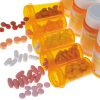- Empty cart.
- Continue Shopping
The Risks of Over-the-Counter Medication Abuse

Over-the-counter (OTC) medications are readily available without a prescription and are often used to relieve minor ailments and symptoms. While OTC medications can be safe and effective when used as directed, their misuse or abuse can lead to significant health risks.
What Constitutes Over-the-Counter Medications
Common OTC Medications
Over-the-counter medications include pain relievers (e.g., acetaminophen, ibuprofen), cough and cold remedies, antihistamines, sleep aids, laxatives, and antacids, among others.
Accessibility
OTC medications are easily accessible at pharmacies, grocery stores, and convenience stores, making them widely available to the general public.
The Risks of OTC Medication Abuse
1. Health Risks
Misusing OTC medications can lead to adverse health effects, such as liver damage from acetaminophen overdose or gastrointestinal bleeding from excessive NSAID use.
2. Tolerance and Dependence
Some OTC medications, such as certain cough syrups and sleep aids, can lead to tolerance, meaning individuals may require higher doses to achieve the same effects. This can lead to dependence and addiction.
3. Polydrug Abuse
OTC medications are sometimes abused in combination with other substances, including alcohol or illicit drugs, increasing the risk of dangerous interactions and overdose.
Commonly Abused OTC Medications
1. Cough and Cold Medications
Some cough and cold medications contain ingredients like dextromethorphan (DXM), which, when abused in high doses, can produce hallucinations and dissociative effects.
2. Sleep Aids
Overusing sleep aids, like diphenhydramine, can lead to drowsiness, impaired coordination, and cognitive dysfunction.
3. Pain Relievers
Abusing OTC pain relievers can lead to liver damage, gastrointestinal bleeding, and kidney problems.
Recognizing OTC Medication Abuse
Signs and Symptoms
Common signs of OTC medication abuse include unexplained changes in behavior, mood swings, changes in sleep patterns, secrecy about medication use, and an obsession with obtaining and using OTC medications.
Withdrawal Symptoms
Dependence on certain OTC medications can lead to withdrawal symptoms when trying to quit, including anxiety, restlessness, and insomnia.
Seeking Help and Treatment
Professional Assistance
If you or someone you know is struggling with OTC medication abuse, seek help from a healthcare professional, therapist, or addiction specialist. They can provide guidance and treatment options.
Support Groups
Joining a support group or seeking counseling can offer emotional support and strategies for overcoming OTC medication abuse.
Prevention
Educate Yourself
Understand the risks associated with OTC medications, and read labels carefully. Always follow dosing instructions and do not exceed recommended doses.
Communication
Openly communicate with healthcare providers about OTC medication use, especially when taking other prescription medications or if you have underlying health conditions.
Safe Storage
Keep OTC medications out of reach of children and adolescents to prevent misuse or accidental ingestion.
In conclusion, while over-the-counter medications are intended to provide relief from minor ailments, their misuse or abuse can lead to serious health risks, including physical and psychological harm. It is crucial to use these medications responsibly, follow dosing instructions, and seek professional help if you or someone you know is struggling with OTC medication abuse. By being informed, cautious, and proactive, you can protect your health and well-being and avoid the dangerous consequences of misuse.








